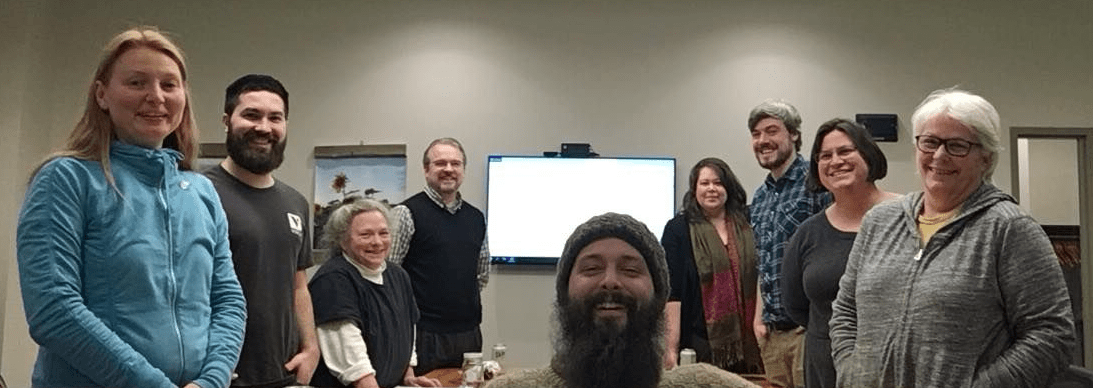
Investing in community
Many people like to support local business by shopping at their neighborhood co-op, but they may not realize that they can take that support to the next level.
Co-ops are member-owned organizations, which means they offer their customers the opportunity to take ownership in the company by investing financially.
A few years ago, Elias Gardner and his coworkers undertook the process of restructuring their school into a worker-owned, educational co-op where the financial and logistical decisions were dispersed across the group.
"Through this process, I realized I’ve always been involved in co-ops. My electric utility was a co-op, my bank was a co-op and my grocery store was a co-op. I never realized that it was such a big part of my life." —Elias K Gardner
He also discovered that securing funding for co-ops in the US is a real challenge. Traditional banks don’t understand the way co-ops are organized so it’s much harder for them to raise money.
To fill this niche, Elias and some friends created another avenue for co-ops to get money. They founded the Vermont Solidarity Investing Club (VSIC) as a way for Vermonters to join forces to help fund co-ops in their area.
"The club is a way for a group of us to put our money together and invest in the cooperative economy." —Elias K Gardner
It operates as an LLC to allow people who don’t have a lot of spare change to still invest directly into businesses. The club accumulates capital through members' monthly investments (between $20 and $200) and then democratically decides which co-ops and cooperative organizations to invest in.
“Our Most Essential Tool”
One of the main goals of the group is to be a community that everyone feels welcome in. They allow investments at a relatively low number because they want people who are new to investing to feel comfortable getting involved.
"The more heads you put into something, the better ideas you get and the more you get buy-in from people." — Elias K Gardner
They encourage everyone to come with thoughts and opinions, which is great for morale but has the potential to lead to long and inefficient decision-making.
"Without Loomio, I don’t think we could make a lot of decisions in a dispersed way as we do." — Elias K Gardner
Elias explains that Loomio’s tools helped them build their process for decision-making from the ground up.
"I like that Loomio has a number of different ways to make a decision because depending on what you’re discussing, a different way is more appropriate." — Elias K Gardner
VSIC uses Loomio to decide when meetings will happen, which organizations they are going to fund and the amount of funds they will allocate to each co-op on their list.
Never Going Back
Loomio has been a part of VSIC’s operations from the beginning, but it took them a while to realize its full potential for their group. When the club first started, the members met every two weeks in-person.
Discussions were fruitful but long, and they quickly realized that it was not going to be a sustainable schedule.
At one of their meetings, the group was nearing a conclusion about a decision but elected to hold off on the final call so that they could test out Loomio’s process instead. They all went home and made the decision online.
By the next meeting, there was almost unanimous consensus to use Loomio for all of their decisions moving forward.
"Honestly, once we started, we haven’t gone back." — Elias K Gardner
Effective Decision Making
Elias explained that using Loomio gives people the time to think through their decisions and voice their thoughts in a more digestible way. He loves that he has time to look through the discussions on Loomio before voting himself because it helps him feel more secure in his decisions.
"I love that there’s a conversation! It means we come to decisions that are more aligned with everyone’s feelings." — Elias K Gardner
It also helps ease the travel burden for the group members who live outside of Burlington, Vermont, the club’s main hub. With Loomio they can all still participate equally.
"One reason we use Loomio for our decision making is it lets everyone participate in the most important aspect of [our club]." — Elias K Gardner
This is especially crucial when the group is deciding how to delegate their funds for the month. Elias says that it would be really difficult to decide how much money goes where without a Loomio’s dot voting tool.
"It’s more effective than being in-person for that kind of decision..."
He explains,"To go around the circle and have 20 people say ‘well I want to put $200 here, $300 there and $500 there’ would take an hour, but I can look on Loomio and see what 20 people have decided in a minute!"
This kind of efficiency is important for a dispersed group of people looking to improve their collective community. Elias says that watching the growth of the club has been hugely rewarding and he’s excited to see how their investments will blossom into positive impact.
Tags: Cooperatives Activism Case studies Customer stories Articles and Interviews
